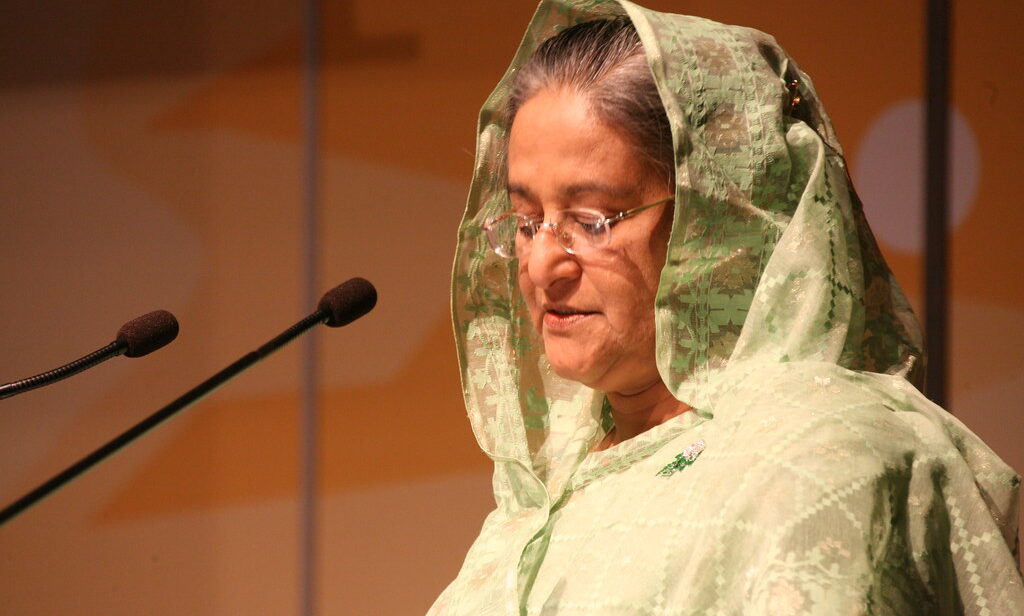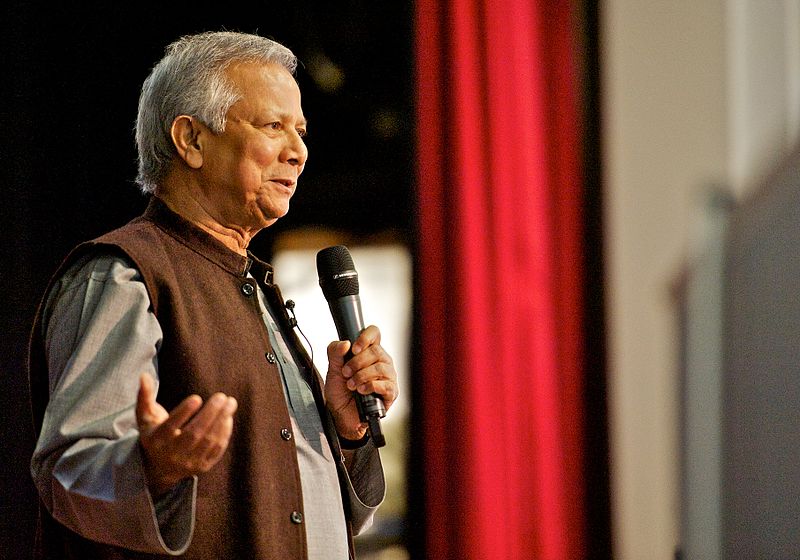
by Aparna Divya
For well over a month, large-scale protests have ravaged Bangladesh, resulting in hundreds of casualties and the resignation of Prime Minister Sheikh Hasina. The protests originally began as a movement against Bangladesh’s quota system, which reserves 56 percent of government jobs for various categories of people, including descendants of those who had fought for the country’s freedom in 1971. But in the wake of a government crackdown, the protests quickly evolved into a test of the Hasina government’s legitimacy and its eventual dissolution.
Given that she was a close strategic ally for India, Hasina’s exit could jeopardize India’s strategic interests. As a new interim government takes charge in the coming days and weeks, India should distance itself from Hasina and support the restoration of democracy in Bangladesh, including free and fair elections. At the same time, India should also engage with the interim government in order to ensure the safety of minority communities in Bangladesh and prevent a potential refugee crisis.
The Fall of Sheikh Hasina
Bangladesh’s student-led protests began this June over a controversial quota system which reserves jobs in government for various categories of people, including descendants of freedom fighters. The system had originally been set up in 1972 — one year after Bangladesh became an independent nation. At the time, it had reserved 30 percent of jobs in the new Bangladesh Civil Service for individuals who had fought for the country’s freedom. By 2010, this benefit had been progressively extended to the children and grandchildren of the freedom fighters, triggering concerns that the Hasina government was using the system to unfairly benefit its supporters. In 2018, the government canceled the quota reservation for some sections of jobs following widespread protests. But in June this year, the 30 percent quota was reinstated by the Bangladesh High Court, triggering the latest round of protests.
Although the protestors had initially focused on reform of the quota system, their demands soon expanded in response to a government crackdown. In late July, Bangladesh’s Supreme Court rolled back some of the quota provisions in response to the protests. But the crisis still worsened after the government imposed a nationwide curfew, cut the internet, and issued shoot-at-sight orders in some areas. These measures added to long-festering resentment over what critics perceived to be Hasina’s years-long lurch toward authoritarianism, which included the imprisonment of several political dissidents and alleged irregularities in elections. All these factors eventually led to calls for Hasina to resign as prime minister. Last week, Hasina finally stepped down, leaving in a helicopter for India.
India Loses an Ally
Hasina’s resignation comes as a major strategic loss for India. During her 15 years in power, Hasina had forged a close relationship with Indian Prime Minister Narendra Modi, turning India and Bangladesh into valued strategic partners. The two leaders had at least ten meetings with each other in just the year 2023 and Hasina was the first foreign leader to travel to New Delhi on a state visit after Modi began his third term this year.
These meetings built on years of consistent high-level engagement between India and Bangladesh, including economic cooperation and security collaboration. For instance, in 2021, the two countries launched the Mitali Express train to connect Dhaka with New Jalpaiguri in the Indian state of West Bengal. Two years later, they launched another railway line — the Akhaura-Agartala cross-border rail link — connecting Bangladesh with Northeast India. These measures ran in parallel with counterterrorism efforts and border security cooperation, especially in Northeast India. In 2015, Bangladesh extradited Anup Chetia to India 18 years after his arrest in Dhaka. Chetia was a founding member of the United Liberation Front of Assam (ULFA) and was one of India’s most wanted insurgents.
The Hasina administration had also been successful in resolving longstanding water-sharing and border disputes. For instance, in 2022, India and Bangladesh signed an agreement on the sharing of the waters of the Kushiyara river. This had followed a landmark agreement in 2015 to resolve the status of enclaves in each other’s territories. These actions strengthened bilateral relations, economic integration, and regional stability, making India and Bangladesh valuable partners to each other.
A Flurry of Challenges Begin
Immediately after the fall of the Hasina government, India briefly witnessed the potential economic and security consequences it may have to face due to political instability in Bangladesh. For days, all commercial activities at the India-Bangladesh border were at a complete standstill, resulting — according to some estimates — in losses of nearly USD $18 million a day. The halt in trade impacted perishable items as well as vital supplies for factories. In addition to trade disruptions, India’s Border Security Force (BSF) said that it was dealing with attempts by hundreds of Bangladeshis, primarily religious minorities, to cross into India. Since vast stretches of the land border remain unfenced, policing the border to prevent a sudden influx of refugees has already become a significant strain on BSF resources.

On the political front, India now confronts an uncertain and fast-evolving future in Bangladesh with sundry risks and challenges. Following Hasina’s resignation, Bangladesh President Mohammed Shahabuddin dissolved the Parliament and ordered the release of former Prime Minister Khaleda Zia who heads the opposition Bangladesh Nationalist Party (BNP). In addition, an interim government has been formed, headed by the Nobel-winning economist Muhammad Yunus. These developments may also make New Delhi anxious. When the BNP was previously in power, several insurgent groups operating in Northeast India, such as ULFA, had found refuge in Bangladesh. This history is now further complicated by the possibility that India may face some resentment for its longstanding support for Hasina. Yunus himself has already acknowledged this sentiment. In an article for The Economist, Yunus wrote that India has “earned the enmity of Bangladeshi people” because of its support for Hasina.
Navigating the Rocky Road Ahead
Given that India had taken in Hasina immediately after her departure from Bangladesh, it is crucial for New Delhi to navigate the new political landscape carefully while still fulfilling its strategic interests. To this end, India needs to work to build relations with the interim government and gain its trust while keeping a close eye on the overall political landscape.
India also needs to take an urgent call on how it would like to deal with a potential refugee crisis on the Bangladesh border. Amid the protests, West Bengal Chief Minister Mamata Banerjee had offered sanctuary to refugees and migrants from Bangladesh. But a liberal refugee policy could encounter resistance from the northeastern states. At the same time, since there have been reports of attacks on Hindu properties and establishments in Bangladesh, denying entry to Hindu refugees could harm the Modi government’s standing. This puts New Delhi in a tough spot. In order to prevent a potential refugee crisis, the Indian government should engage with the interim government in Bangladesh to ensure the safety of minority communities.
Separately, India should advocate for the strengthening of democratic processes and institutions in Bangladesh. India should use available diplomatic channels to support the development of a coalition of opposition forces, ensuring the inclusion of moderates, technocrats, and conservative factions not hostile to India’s interests. India must also symbolically distance itself from Hasina to show that it is ready to move on. New Delhi must avoid reinforcing perceptions that it remains aligned with Hasina’s party, the Awami League.
The current crisis in Bangladesh presents India with serious strategic challenges, encompassing border security, regional stability, and economic disruption. India needs to continue being watchful and stand ready to adapt to the changes that lie ahead in Bangladesh’s political landscape.
source : southasianvoices
